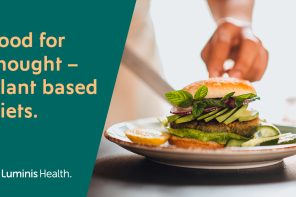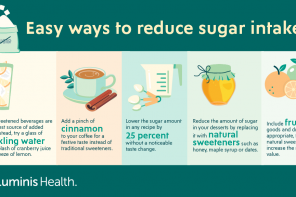Antioxidants. They seem to be in everything these days, from granola bars to beauty products. But what are they? How should you get them? And how much do you need? Antioxidants are substances that may protect cells in your body from free radical damage that can occur from exposure to certain chemicals, smoking, pollution, radiation, and as a byproduct of normal metabolism. Dietary antioxidants include selenium, vitamin A and related carotenoids, vitamins C and E, plus various phytochemicals such as lycopene, lutein and quercetin.
Antioxidant supplements are not always beneficial.
Some trials found a benefit to antioxidant supplementation, but most have not. Grocery store shelves are full of products with labels claiming they contain antioxidants and implying that you are just a few bites away from better health. But it is not that simple. Too much of a good thing can be bad, especially when it comes from dietary supplementation. Some evidence suggests that when taken in megadoses, antioxidants can become pro-oxidants. This can increase the production of free radicals, particularly in people who smoke or drink alcohol. In these cases, supplements can have unpredictable interactions and turn from potentially healthy to being harmful. In one study, heavy smokers who took high-dose beta-carotene were more likely to get lung cancer. Scientists do not know why the studies have been disappointing. However, one explanation might be that supplements cannot replicate the complex, beneficial effects of a healthy diet.
Are there ‘super fruits’?
All fruits and vegetables are super foods. There is no scientific definition of ‘super foods’, therefore it is meaningless. Marketing has overused this buzzword to sell products. Each fruit and vegetable has a unique distribution of nutrients. By eating only those considered ‘super’ you are short changing your health by skipping the nutrients specific to other produce. So, remember, any and every fruit and vegetable is good for you.
Foods that contain a lot of antioxidants are good for your health.
Most health experts agree antioxidant supplements are not worth your money. But, antioxidant rich foods are! Fruits, vegetables and whole grains are all rich in antioxidants. They also have healthy fiber and essential nutrients that your body needs for long-term health. As scientists continue to explore how antioxidants work in the body, the best advice remains the simplest: Eat a variety of brightly colored fresh fruits and vegetables, whole grains and legumes. This daily dose can improve your health.
Advertising has gone too far.
Some packaged food labels insist that antioxidants will boost your health. However, these claims do not always mean a health benefit. Unfortunately, ‘antioxidant’ is a loosely used term. Outside the lab, it has become more of a marketing term than a scientific one. For example, some manufacturers add an antioxidant, such a vitamin E and zinc, and then label the product as containing antioxidants (likely in hopes of boosting sales such as Kellogg’s Fiber Plus Antioxidants Dark Chocolate Almond bars). It’s true they have vitamin E and zinc. But this comes at a cost of 7 grams of sugar and 5 grams of fat. A preferred, non-processed choice to get these nutrients could be an ounce of almonds, which provides more vitamin E, and 3 ounces of lean beef, which has more zinc.
It is important to keep in mind that too much of a good thing can be problematic, especially when it comes from dietary supplements. Beware of multi and single antioxidant capsules labeled megadoses, which contain more than the recommended daily values of antioxidants. Supplements can have unpredictable interactions and potentially cause more harm than good. It is much less likely that you will consume too many antioxidants from food. Most Americans do not eat enough fruits and vegetables. If you want to boost your intake, then stick to a wide variety of produce.
Ann Caldwell and Maureen Shackelford are nutritionists and registered dietitians at Anne Arundel Medical Center. To reach them, call 443-481-5555. 




